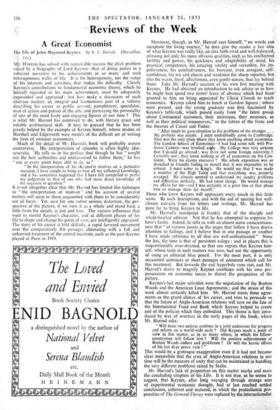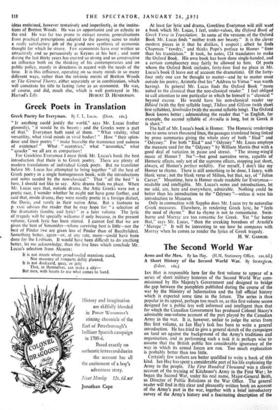Reviews of the Week
A Great Economist r. HARROD has solved with remarkable success the chief problem ed by a biography of Lord Keynes—that of doing justice in a cdllhhrrerent narrative to his achievements in so many and such heterogeneous walks of life. It is the heterogeneity, not the range of his interests and activities, that makes the difficulty. Clearly Keynes's contributions to fundamental economic theory, which he himself regarded as his main achievement, must be adequately expounded and appraised ; but how make a discussion of such abstruse matters an integral and harmonious part of a volume describing his career as public servant, pamphleteer, speculator, man of action and patron of the arts, and portraying the personality of one of the most lively and engaging figures of our time ? This is what Mr. Harrod has contrived to do, with literary grace and notable architectural skill. It may be guessed that he has been greatly helped by the example of Keynes himself, whose studies of Marshall and Edgeworth were models of the difficult art of writing the lives of eminent economists.
Much of the detail of Mr. Harrod's book will probably arouse controversy. His interpretation of episodes is often highly idio- syncratic. He tells us in his preface that though he has " sought out the best authorities and endeavoured to follow them," he has " not at every point been able to do so." "In the interpretation of his (Keynes's) motives on a. particular occasion. I have sought to bring to bear all my collateral knowledge, and it has sometimes happened that I have felt compelled to prefer my judgement to that of one who had more direct knowledge of the occasion in question."
It is not altogether clear that Mr. Harrod has limited this technique to " the interpretation of motives." and his account of several matters will seem to those acquainted with them to be considerably out of focus. Yet, save for one rather serious distortion, the per- spective of the picture, if we view it as a whole and stand back a little from the details, is just and true. The various influences that went to mould Keynes's character, and at different phases of his life to shape and change his point of view, are intelligently appraised. The story of his career is told skilfully, a rapid forward movement over the comparatively flat passages alternating with a full and unhurried treatment of the central incidents, such as the part Keynes played at Paris in 1919. Moreover, though, as Mr. Harrod says himself, " no words can recapture the living essence," he does give the reader a fair idea of what Keynes was really like, an idea both vivid and well-balanced, stressing not only his more obvious qualities, such as his intellectual fertility and power, his quickness and adaptability of mind, his practical competence, his amazing vitality and versatility, his int- pulsiveness, his combativeness, his buoyant, even arrogant, self- confidence, his wit and charm and weakness for sharp repartee, but also the warm, loyal, affectionate, even gentle nature, that lay behind them. Take Mr. Harrod's account of his own first meeting with Keynes. He had obtained an introduction to ask advice as to how he might best spend two terms' leave of absence which had beers' granted to him on being appointed by Christ Church to teach economics. Keynes asked him to lunch at Gordon Square ; others were present, and the young graduate was first fascinated by Keynes's table-talk, which passed easily from " the latest gossip about Continental statesmen, their mistresses, their neuroses, as well as their political manoeuvres," to the future of the franc and the theories of Cassel and Fisher.
" After lunch he gave attention to the problems of the stranger.... My problem was simple. I must undoubtedly come to Cambridge. That was the only place where they knew anything about economics. The London School of Economics—I had had some talk with Pro- fessor Canaan—was brushed aside. My College was very anxious that I should go abroad ; was there not some foreign university ? Certainly not ; they knew nothing at all of economics on the Con- tinent. Were his claims excessive ? His whole exposition was so drenched in friendly feeling to myself that it was impossible to be critical. I must come to King's. He would see that I was made a member of the High Table and that everything was properly arranged. He already seemed to understand my sundry problems and difficulties perfectly. He had taken charge. He would manage my affairs for me—and I was certainly at a great loss at that phase how to manage them for myself."
Those who knew Keynes will appreciate every touch in this little scene. By such descriptions, and with the aid of sparing but well- chosen extracts from his letters and writings, Mr. Harrod has gone far to bring Keynes to life.
Mr. Harrod's standpoint is frankly that of the disciple and whole-hearted admirer Not that he has attempted to suppress his hero's faults. Indeed, he tells us with an almost naive conscientious- ness that "at various points in the pages that follow I have drawn attention to failings, and I believe that in one passage or another I have made reference to all that are well-authenticated." None the less, the tone is that of persistent eulogy ; and in places this is unquestionably over-strained, so that one regrets that Keynes him- self, whose taste in such matters was sure, had not the opportunity of using an editorial blue pencil. For the most part, it is only occasional sentences or short passages of comment which call for this treatment. But towards the end hyperbole runs riot, and Mr. Harrod's desire to magnify Keynes combines with his own pre- possessions on economic issues to distort the perspective of the picture.
Keynes's last major activities were the negotiation of the Bretton Woods and the American Loan Agreements ; and the strain of this work almost certainly killed him. Mr. Harrod treats these agree- ments as the grand climax of his career, and tries to persuade us that the future of Anglo-American relations will turn on the fate of the International Fund and Bank which Keynes helped to create and of the policies which they embodied. This theme is first intro- duced by way of overture in the early pages of the book, where Mr. Harrod asks: " Will these two nations continue in a joint endeavour for progress and reform on a world-wide scale 7 Did Keynes reach a point of view in this matter. as in so many others, in which his fellow- countrymen will follow him ? Will the positive achievements of Bretton Woods endure and proliferate 7 Or will the heroic efforts of his last days prove vain " This would be a grotesque exaggeration even if it had not become clear meanwhile that the crux of Anglo-American relations in our time will be the measure of unity that can be maintained in handling the very different problems raised by Stalin.
Mr. Harrod's lack of proportion on this matter marks and mars the concluding chapters of his Life. It is not true, as he seems to suggest, that Keynes, after long voyaging through strange seas of experimental economic thought, had at last reached settled conclusions, coherent and matured, in which the protectionist pro- pensities of The General Theory were replaced by the internationalist ideas enshrined, however tentatively and imperfectly, in the institu- tions of Bretton Woods. He was an opportunist and an eclectic to the end. He was far too prone to extract cosmic generalisations from practical prescriptions adapted to the passing scene to make a really satisfactory job of the grand new synthesis of economic thought for which he strove. Few economists have ever written so attractively and so persuasively as Keynes at his best ; and none during the last thirty years has exerted so strong and so constructive an influence both on the thinking of his contemporaries and on public policy, mostly in directions in accord with the needs of the time. It is this influence, operating on so many minds in so many different ways, rather than the intrinsic merits of Bretton Woods or The General Theory, either separately or in combination, which will constitute his title to lasting fame as an economist. He was, of course, and did, much else, which is well portrayed in Mr.







































 Previous page
Previous page